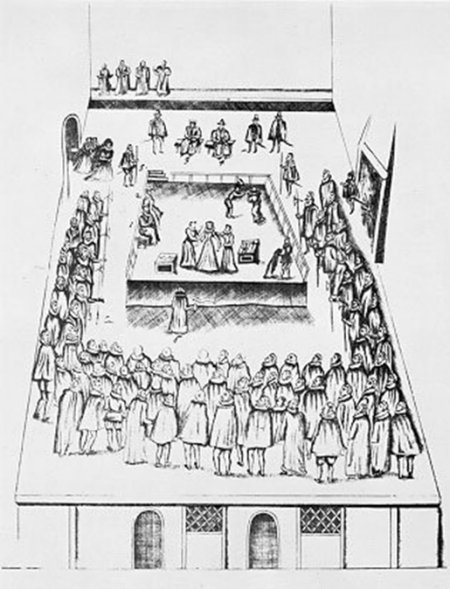Robert Beale (1541-1601)
Robert Beale was a lawyer, able administrator, diplomat and parliamentarian. He was also a forthright puritan and this eventually led to his exile from the Court of Elizabeth 1.
In his book 'Bygone Woodbridge' the historian Vincent Redstone claims that Robert Beale's parents lived in Woodbridge. There is no dispute that there were Beales in the town during the sixteenth century but there is no firm evidence of any connection with Robert Beale. The consensus modern historians appears to be that Robert Beale's father was a London mercer. Because of this element of doubt only a short account of Robert Beale's life is given here.
During the reign of Mary, Robert Beale fled abroad and was student at Strasbourg and by the 1560s he was part of part of the retinue of the ambassador to Paris. When Francis Walsingham arrived as ambassador, in 1570, Beale became his secretary. The two were to work closely together at the heart of Elizabethan government for 23 years and Beale married the sister of Walsingham’s wife.
While in Paris they both witnessed and wrote about the massacre of Protestants on the eve of feast of Bartholomew the Apostle.
In 1572, a year before Walsingham returned to London to become secretary of state to Queen Elizabeth, Walsingham made Beale one of the clerks to the privy council. He held this office until 1593 and for the majority of his tenure he was the pre-eminent clerk. He also deputised for Walsingham whenever he was absent.
From 1581 Beale became significantly involved in the problem of what to do with Mary Queen of Scotland. He negotiated with her at the direction of the privy council to try to resolve the diplomatic questions between Scotland and England and to encourage her to conform to English expectations of her. He treated her with unusual civility and in return she bestowed upon him a gold chain worth £65. So we can only speculate on his feelings when, in November 1586, he was dispatched to Fotheringay to notify her that she had been sentenced to death.
Early in the following year Beale carried the death warrant to Fotheringay and performed the duty of reading it aloud in the hall of the castle by way of the preliminary to the execution, of which he was an eye-witness. He wrote an account of the episode which included the sketch shown on the right.
Beale's work for the privy council, and his previous experience at the embassy in Paris, made him an ideal candidate for a variety of diplomatic activities in Germany and the Low Countries. He also served as member of parliament for Totnes (1572), Dorchester (1584, 1586 and 1589) and Lostwithiel (1593). He was an active parliamentarian and he served on a number of committees.
Within parliament he was a strong advocate of puritan causes and this led to his downfall. His religious views set him apart from other royal servants and in 1593 he was exiled from court. To win back royal favour he wrote two texts urging religious toleration and was eventually partially restored to royal favour. His last official act was as senior advisor to the Anglo-Spanish negotiations in 1600. He died a year later.

Beale’s sketch of the execution of Mary
Last edited 16 Aug 23